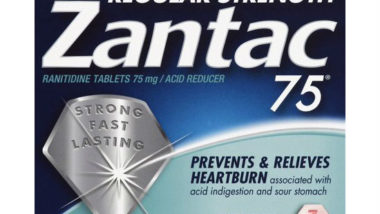Top Class Actions’s website and social media posts use affiliate links. If you make a purchase using such links, we may receive a commission, but it will not result in any additional charges to you. Please review our Affiliate Link Disclosure for more information.

What is Prilosec?
Prilosec belongs to a class of drugs known as proton pump inhibitors (PPIs). They are prescribed most frequently for symptoms of gastroesophageal reflux disease, or GERD. Other indications for Prilosec include
- Zollinger-Ellison Syndrome (overproduction of stomach acid due to tumors of the pancreas)
- peptic ulcer
- Barret’s Esophagus (inflammation of the esophageal resulting from chronic GERD)
- eosinophilic esophagitis (an allergic reaction in the esophagus)
- gastritis (inflammation of the stomach lining)
- helicobacter pylori infection
- common indigestion (dyspepsia)
Prilosec is not recommended for immediate, short-term heartburn relief.
How Does Prilosec Work?
Like other medications of the proton-pump inhibitor class, Prilosec’s mechanism of action targets the action of the parietal cells that secrete hydrochloric acid, the primary component of digestive juice. The full explanation is rather complicated; suffice it to say that PPIs shut down the terminal, or final stage of the process by which hydrochloric acid is secreted, preventing the production of stomach acid (somewhat analogous to cutting off the fuel injectors of your car’s engine).
This effect is permanent; once the proton pump has been shut down, it cannot be reactivated. This is one reason that medical researchers advise against using Prilosec long-term.
What Are the Common Side Effects of Prilosec?
Prilosec side effects that are frequently reported include:
- headache
- nausea
- diarrhea
- abdominal pain
- dizziness
Less often, Prilosec may cause:
- skin rash and itching
- flatulence
- constipation
- psychological effects such as depression or anxiety
Because stomach acid is required for the release of micronutrients, Prilosec may interfere with the absorption of iron, calcium, magnesium and vitamin B12, according to a 2010 study reported in Current Gastroenterology Reports. This may be why Prilosec has been linked to weakened bones and increased risk of fractures.
What are the Risks of Prilosec Long-Term?
Aside from the possible effect on bone tissue (osteoporosis), use of Prilosec long-term has been associated with:
- cardiovascular disease
- kidney damage
- stomach cancer
- pediatric colon infections
- esophageal cancer
- dementia
- accelerated aging
- increased risk of stroke
- pneumonia in elderly patients
A number of these health dangers may be due to the destruction of beneficial gut flora, which thrives in an acidic environment. These “friendly microbes” are the body’s first line of defense against disease; when they die off because of low acid levels, it leaves a patient vulnerable to a range of illnesses.
Medical researchers now recommend that PPIs such as Prilosec be taken for no longer than two consecutive weeks, no more than three times per year.
Are There Alternatives to Prilosec?
Significantly, one study appearing in the British Medical Journal found that the dangerous PPI side effects listed above for most often noted in patients who had no clear medical reason for Prilosec long-term use, yet had been taking it for months, or even years. Such patients may benefit from changes in lifestyle and diet, or switching to an alternative such as H2 receptor blockers.
If you or someone you know took PPI meds and suffered from Prilosec stomach cancer or were hospitalized for Prilosec kidney problems, you may qualify to file a Prilosec lawsuit to pursue compensation for medical bills, pain and suffering, and more. See if you qualify for a Prilosec lawsuit settlement by filling out the short form on this page. It’s absolutely free to participate, so act now!
ATTORNEY ADVERTISING
Top Class Actions is a Proud Member of the American Bar Association
LEGAL INFORMATION IS NOT LEGAL ADVICE
Top Class Actions Legal Statement
©2008 – 2024 Top Class Actions® LLC
Various Trademarks held by their respective owners
This website is not intended for viewing or usage by European Union citizens.
Get Help – It’s Free
Join a Free Prilosec, Nexium Lawsuit Investigation
If you qualify, an attorney will contact you to discuss the details of your potential case at no charge to you.
PLEASE NOTE: If you want to participate in this investigation, it is imperative that you reply to the law firm if they call or email you. Failing to do so may result in you not getting signed up as a client or getting you dropped as a client.
E-mail any problems with this form to:
Questions@TopClassActions.com.
Oops! We could not locate your form.












